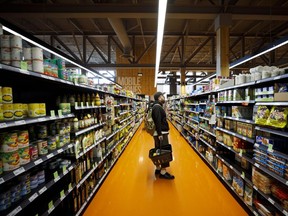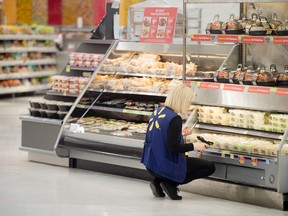VOLUNTARY REGS ARE NO REGS AT ALL
Fate of Canada's first grocery code of conduct in doubt with 2 big players on the fenceLoblaw, Walmart express worries code will increase food prices
Jake Edmiston
Published Oct 27, 2023

A shopper browses products at a Loblaw Cos. grocery store in Toronto. Loblaw said it has worries food prices will go up under a grocery code of conduct. PHOTO BY COLE BURSTON/BLOOMBERG
Article content
The fate of Canada’s first-ever grocery code of conduct appears to be in doubt, with two of the country’s largest retailers expressing concerns that the document as drafted will be bad for business and drive up food prices for customers.
Industry leaders have been trying to reach an agreement on a code of conduct for more than two years after legislators ordered them to come up with new rules to govern dealings between grocers and suppliers. The hope is the rules will put a stop to alleged bullying tactics in the food chain and end decades of acrimony over the fees and fines manufacturers say they’re forced to pay just to get their products on shelves.
Article content
The fate of Canada’s first-ever grocery code of conduct appears to be in doubt, with two of the country’s largest retailers expressing concerns that the document as drafted will be bad for business and drive up food prices for customers.
Industry leaders have been trying to reach an agreement on a code of conduct for more than two years after legislators ordered them to come up with new rules to govern dealings between grocers and suppliers. The hope is the rules will put a stop to alleged bullying tactics in the food chain and end decades of acrimony over the fees and fines manufacturers say they’re forced to pay just to get their products on shelves.
Canada’s Industry Minister François-Philippe Champagne has become one of the most vocal proponents of a code of conduct, promising to help accelerate work as part of the federal government’s recent push to fix a national affordability crisis. A code has the power to make “meaningful improvements across the whole of the grocery supply chain,” he said in a statement earlier this month.
But at this point, the industry-led negotiations have come up with a voluntary system that allows companies to decide whether or not they want to sign the code and abide by the new rules.
The benefit of a voluntary system is it’s simpler and quicker to roll out than a mandatory, government-regulated code. Ottawa has already determined that such a code isn’t under federal jurisdiction, so it would fall to the provinces to implement, and few in the industry are keen on trying to navigate a patchwork of different regional codes spread across the national food supply chain.
But the downside of a voluntary code in an industry where five chains control 80 per cent of grocery sales is that it just takes one or two holdouts for the whole thing to start falling apart. That appears to be what’s happening now.
“We don’t know whether everybody is going to play right now,” said Michael Graydon, a manufacturing lobbyist who leads the Food, Health and Consumer Products of Canada and co-chairs the committee of industry associations that has been leading the negotiations. “There are organizations out there that still don’t believe this is the way forward.”
At a Toronto grocery conference this week, he said the process is now in the 11th hour, with consultations on a final draft already completed. A draft distributed at the conference included rules against unilaterally altering supply contracts, as well as provisions outlining when grocers can charge fines and how parties manage situations when demand outstrips supply.
We don't know whether everybody is going to play right nowMICHAEL GRAYDON
The code will establish a watchdog to help resolve disputes, but that office won’t have much punitive power against bad actors outside of public shaming, Graydon said.
The code and the watchdog office are expected to be up and running by the first quarter of 2024. But some major players are pushing back.
Graydon told the crowd at the conference that if the voluntary code doesn’t get off the ground, the industry can expect more government intrusions.
“They do not understand our business, so we’ve got to keep them out of it as best we can,” he said.
Following the remarks, the Financial Post asked the five major grocers whether they planned on signing the code.
Costco Corp. didn’t respond, while Sobeys’ parent Empire Co. Ltd. and Metro Inc., the second- and third-largest grocers, said they support it. But Loblaw Cos. Ltd., the largest grocer, said it is worried the code will backfire for shoppers.
“We have ongoing concerns that the code, as currently drafted, will increase food prices for Canadians and impact grocers’ ability to have the right products on store shelves to meet customers’ demands,” Loblaw spokesperson Catherine Thomas said in an email. “We remain actively engaged in an effort to improve the code so that it works to benefit everyone — particularly customers.”

An employee at a Walmart store in Ontario. The company says it has concerns over a grocery code of conduct.
PHOTO BY PETER J. THOMPSON/FINANCIAL POST FILES
Wal-Mart Canada Corp. had similar worries.
“While we support initiatives that will ultimately deliver value and low prices to our customers, we’re also conscious of adding unnecessary burdens that could increase the cost of food for Canadians, especially during inflationary times,” spokesperson Stephanie Fusco said in an email.
Graydon called their comments “disappointing” and suggested the two chains were using concerns around inflation as an excuse not to participate.
“Come into the code, work with us for a year, see how it goes, make certain modifications if we have to, and if it doesn’t work out then leave,” he said, adding that other countries that have implemented grocery codes, including the United Kingdom, haven’t experienced higher prices because of it. “To sit on the sidelines today and make those accusations today without any experience, to me, it doesn’t make sense.”
If Walmart and Loblaw ultimately decide not to sign the code, Graydon said it will put the industry on a new path.
“Our focus will revert to trying to get this thing regulated and force them to participate in the code,” he said.
Wal-Mart Canada Corp. had similar worries.
“While we support initiatives that will ultimately deliver value and low prices to our customers, we’re also conscious of adding unnecessary burdens that could increase the cost of food for Canadians, especially during inflationary times,” spokesperson Stephanie Fusco said in an email.
Graydon called their comments “disappointing” and suggested the two chains were using concerns around inflation as an excuse not to participate.
“Come into the code, work with us for a year, see how it goes, make certain modifications if we have to, and if it doesn’t work out then leave,” he said, adding that other countries that have implemented grocery codes, including the United Kingdom, haven’t experienced higher prices because of it. “To sit on the sidelines today and make those accusations today without any experience, to me, it doesn’t make sense.”
If Walmart and Loblaw ultimately decide not to sign the code, Graydon said it will put the industry on a new path.
“Our focus will revert to trying to get this thing regulated and force them to participate in the code,” he said.
Our focus will revert to trying to get this thing regulated and force them to participate in the codeMICHAEL GRAYDON
Talks around the code date back to the first few months of the pandemic when food manufacturers complained the major grocery chains were slapping them with extra fees and penalizing them for short orders, even though food producers were struggling to stay on top of a sudden jolt of demand for food.
In what became a flashpoint for manufacturers, Walmart and Loblaw in 2020 unilaterally imposed fees on their suppliers to help cover the cost of the retailers’ investments in e-commerce and other upgrades as online grocery orders skyrocketed during the lockdowns.
The suppliers said they had no choice but to pay up, since each grocers’ market share was so big they couldn’t afford to stop doing business with either of them. Politicians took notice, including a coalition of federal, provincial and territorial agriculture ministers who launched an investigation into grocery fees.
By the summer of 2021, the ministers brought in a mediator to help draft a code of conduct with lobby groups representing farmers, food processors, independent grocers and national retail chains.
At the time, the ministers told the industry that if they couldn’t come up with a solution on their own, government would step in and do it for them. By January 2023, Marie-Claude Bibeau — Canada’s then-agriculture minister — said she expected the code to come into force by year-end.
Gary Sands, a member of the code’s steering committee and senior vice-president of the Canadian Federation of Independent Grocers, said it was “disingenuous” for Walmart and Loblaw to bring up concerns about price impacts so late in the process.
“You’ve had close to three years and we’ve never heard that concern,” he said.
• Email: jedmiston@postmedia.com



No comments:
Post a Comment